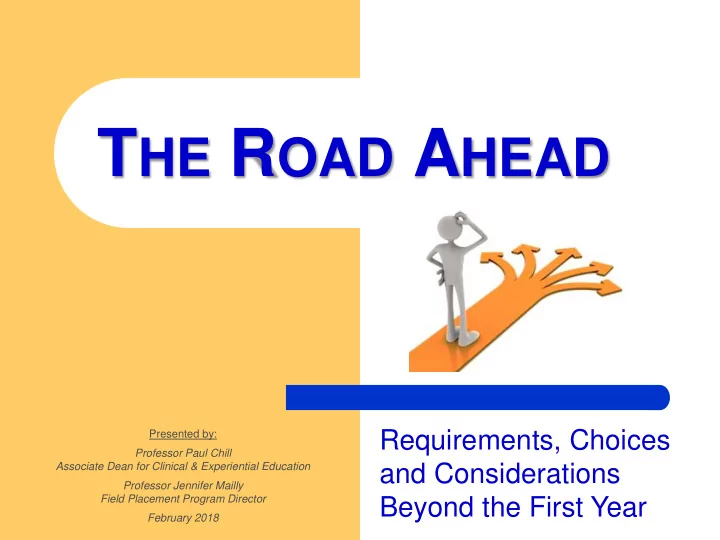

T HE R OAD A HEAD Requirements, Choices Presented by: Professor Paul Chill Associate Dean for Clinical & Experiential Education and Considerations Professor Jennifer Mailly Field Placement Program Director Beyond the First Year February 2018
Academic Regulations 2
Academic Regulations 3
Deadlines 4
86 Credits Academic Regulations §1.1.1: "All candidates for the Juris Doctor degree must successfully complete a minimum of eighty-six (86) credits and pass all required courses." Day students need 53 additional credits after first year o On average, 13.25 per semester Evening students need 64 additional credits after first year o On average, 10.7 per semester (including required 2LE courses) 5
Upperclass Requirements* Legal Profession - 3 credits Upper-Class Writing Requirement - 2-3 credits Practice-Based Learning Requirement - 3+ credits * Evening students must also complete 4 credits each of Constitutional Law and Property during their second year, as well as a 3-credit Stat-Reg Elective 6
Upper-Class Writing Requirement 1. Substantial, intensive writing experience ESSENTIAL 2. Supervised by full-time professor 3. At least one re-draft based on feedback FEATURES 4. Mandatory research training 5. Multiple ways to satisfy Scholarly paper Predictive memo or persuasive brief 2+ credit SRP Paper in designated seminar 2+ credit SRP Paper in lieu of exam with Paper in designated seminar permission of instructor Paper(s) in lieu of exam with permission of instructor Certain clinic briefs and memos Completion of Advanced Legal 7 Writing course
PRACTICE-BASED LEARNING REQUIREMENT IN-HOUSE CLINICS PARTNERSHIP CLINICS FIELD PLACEMENTS Asylum & Human Center for Energy & Environmental Center for Children's Advocacy Rights Clinic Law (CEEL) Field Placement Connecticut Urban Legal Initiative Criminal Clinic (CULI) Legislative Field Placement (Trial & Appellate Divisions) (“Transactional Clinic”) Intellectual Property & Elder Law Clinic State's Attorney's Field Placement Entrepreneurship (with Office of CT Chief State’s Attorney) (with Czepiga Daly Pope & Perri) Law Clinic Individual Field Placement Veterans’ Benefits Advocacy Clinic International Law & Human Rights (satisfies PBLR only if taken concurrently with Clinic (with CT Veterans Legal Center) Individual Field Placement Seminar) Environmental Law Clinic Mediation Clinic Semester in DC Program (with CT Fund for the Environment/ Save the Sound) United States Attorney's Clinic Tax Clinic (with U.S. Department of Justice) Designed especially for evening students (but open to all) For more information, see separate guide to “Clinics and Field Placements 2018- 2019” posted on website May also be accessible to evening students
Elective Courses & Seminars “Perspectives” courses: Some staples: Administrative Law Comparative Law – – Business Organizations Contemporary Legal Theory – – Conflicts of Law Jurisprudence – – Criminal Procedure Main Currents in Legal History – – Evidence – A sampling of the many others: Family Law – Employment Discrimination Law – Federal Income Tax – Environmental Law – Trusts & Estates – Federal Courts – Simulation courses and Immigration Law – practicums: Intellectual Property – Advanced Legal Writing – International Law – Contract Drafting – Law & Literature – Technology and Law Practice – Principles of Insurance – 9 Trial Advocacy – Sexuality, Gender and the Law –
Areas of Curricular Interest 10
Other Ways to Earn Credit Special research projects (SRPs) Teaching assistantships Journals CT Law Review – CT Journal of International Law – CT Insurance Law Journal – CT Public Interest Law Journal – Extramural moot court and mock trial competitions Non-law courses 11
Special Academic Programs Dual Degrees International Exchanges JD/MBA Aix-en-Provence ( France) JD/MPA Bar Ilan University (Tel Aviv, Israel) JD/MPH Freie Universitat Berlin (Germany) JD/MSW Leiden University (Netherlands) Pompeu Fabra University (Barcelona, Spain) Certificates Tilburg University (Netherlands) Corporate & Regulatory University College Dublin (Ireland) Compliance University of Antwerp (Belgium) Energy & Environmental Law University of Exeter (England) Human Rights University of International Business & Intellectual Property Economics (Beijing, China) Law & Public Policy University of Mannheim (Germany) Tax Studies University of Muenster (Germany) Transactional Practice University of Nottingham (England) University of Puerto Rico 12 University of Siena (Italy)
Limits & Thresholds SUBJECT MAXIMUM MINIMUM COMMENTS Credits outside of regularly- 22 scheduled courses and clinics Pass/fail credits that can be Must take at least two graded 12 counted toward graduation courses each fall or spring term Total combined SRP and Individual Max. of 3 credits of each in any 8 Field Placement credits fall/spring semester, 4 in summer Must be pre-approved; does not 6 Credits for non-law school courses include dual degree programs Credits per semester (without 16 (full-time) Absolute limit is 17 credits special permission) 12 (part-time) 60 (full-time) 24 Length of study (in months) 72 (part-time) 2.3 GPA 6 semesters of ≥ 10 credits F/T (or equivalent); Residency 8 semesters of ≥ 8 credits P/T (or equivalent) 13 (Note: Some of these limits and thresholds can be waived by the Petitions Committee. All course pre- and co-requisites can be waived by the instructor.)
Considerations What to Take Beyond Course Selection Talk to professors Building relationships and connections Tailor to own interests and career Faculty o plans/aspirations Student organizations o Balance of modalities Professional organizations & networking o Breadth vs. depth Bar courses? Prerequisite courses When to Take It Evening courses Experiential education Sequencing for prerequisites Frequency/regularity of scheduling 14
15
Recommend
More recommend